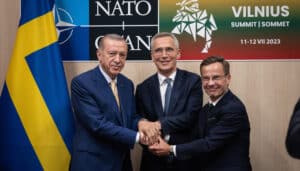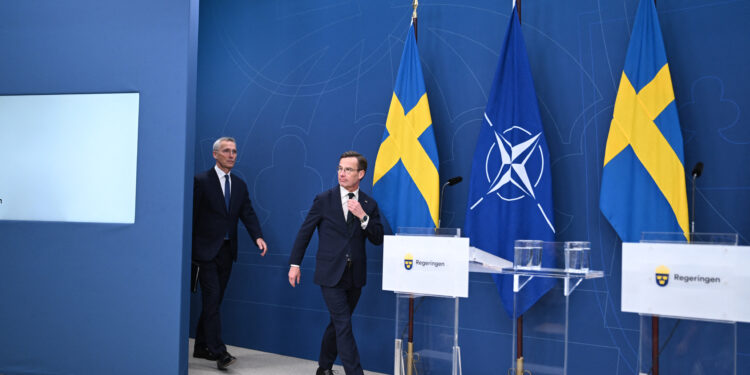Brussels – One of the thorniest chapters of the past two years within NATO, the Turkish standoff over ratification of Sweden’s accession protocol to the North Atlantic Treaty Organization, is drawing to a close, but another will likely become even more embarrassing. While the Turkish Grand National Assembly should ratify the Stockholm Accession Protocol this week (between today and Thursday), six months after the decisive agreement between the two leaders at the Vilnius NATO summit, Hungary’s prime minister, Viktor Orbán, announced that he invited the Swedish prime minister Ulf Kristersson to Budapest to “negotiate Sweden’s accession to NATO.”
The Turkish one seemed to be the biggest obstacle to overcome for Sweden’s aspirations to become the 32nd member of the Atlantic Alliance, given the continued delays by President Recep Tayyip Erdoǧan for several criteria he felt were not met according to the memorandum agreement signed on the eve of the Madrid Summit in 2022. These include demands to extradite members of the Kurdish political-military movement of the PKK (Kurdistan Workers’ Party). The Turkish leader’s adamant stance led to the lowest point in relations with the other allies when Finland’s request was accepted while Stockholm blocked. The joint entry of the two Scandinavian countries into the Atlantic Alliance on the same day (April 4, 2023) did not materialize. Just before the start of the Vilnius summit in July last year – and after threatening of wanting to link the path of NATO enlargement to that of Turkey’s accession to the European Union – Erdoǧan himself approved Sweden’s entry in a trilateral meeting with Prime Minister Kristersson and NATO Secretary GeneralJens Stoltenberg. Six months later, the Turkish parliament is ready to fulfill its commitment to ratify the Stockholm accession protocol, ending its obstructionism.

But now, eyes are on Orbán’s Hungary, which is distinguishing itself in a negative sense in Brussels for its constant blackmail not only within the European Union (particularly on the issues of EU funds and support for Ukraine) but also NATO. While the focus was all on Ankara and Erdoǧan’s explicit threats to halt the process in case of non-compliance with the required conditions, in Budapest, the dossier on the ratification of Sweden’s NATO accession protocol never advanced mainly due to the diplomatic clash between the two EU member states. Precisely during Sweden’s six-month presidency of the EU Council (January and July 2023), Premier Kristersson was particularly harsh in his criticism of the erosion of the rule of law brought about by the Orbán government and still is one of the most uncompromising leaders on the Hungarian premier’s blackmail at the European Council table. Orbán’s message about “negotiating Sweden’s accession to NATO” is also a clear signal of the Hungarian parliament’s subordination to the premier’s decisions (just like in Turkey), given also the fact that as of today, there is no vote on the agenda to ratify the Stockholm Accession Protocol.
Sweden’s steps to join NATO
A country must send a formal application, previously approved by its national parliament to become a NATO member. This opens two stages of discussions with the Alliance, which do not necessarily pave the way for membership: the first, the Intensified Dialogue, delves into the country’s rationale for applying; the second, the Membership Action Plan, prepares the potential candidate to meet the necessary political, economic, military, and legal requirements (democratic system, market economy, respect for the rule of law and fundamental rights, standards of intelligence, and contribution to military operations, aptitude for peaceful conflict resolution). This second round of discussions was introduced in 1999, after the accession of Poland, Hungary, and the Czech Republic, to address the process with would-be members with political systems other than those of the Alliance’s founding countries, such as the former Soviet countries.
The accession procedure formally begins with the application of Article 10 of the North Atlantic Treaty, which provides that “the parties may, by unanimous agreement, invite any other European State in a position to further the principles of this Treaty and to contribute to the security of the North Atlantic area to accede to this Treaty.” The resolution must be voted on unanimously by all member countries. At this point, accession talks open at the headquarters in Brussels to confirm the candidate’s willingness and ability to meet the obligations of membership: political and military issues first, security and economic issues second. After the accession talks, which are in effect a negotiations phase, the candidate country’s foreign minister sends a letter of intent to the Alliance Secretary General.
The accession process ends with the Protocol of Accession as an amendment to the Treaty of Washington, the founding text of the Alliance. This Protocol must be ratified by all the members, with procedures that vary from country to country: in Italy, the vote of the joint session of Parliament is required to authorize the President of the Republic to ratify the international treaty. Once the Accession Protocol has been amended, the Secretary General of NATO formally invites the candidate country to join the Alliance, and the agreement is filed at the US State Department headquarters in Washington. At the end of this process, the candidate is officially a member of the North Atlantic Treaty Organisation.
English version by the Translation Service of Withub




